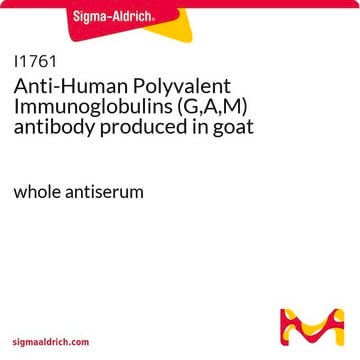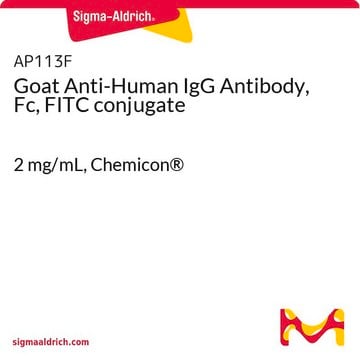F4637
Anti-Human Polyvalent Immunoglobulins (whole molecule)−FITC antibody produced in rabbit
IgG fraction of antiserum, buffered aqueous solution
Synonym(s):
Rabbit Anti-Human Polyvalent Immunoglobulins (whole molecule)−Fluorescein isothiocyanate
About This Item
Recommended Products
biological source
rabbit
conjugate
FITC conjugate
antibody form
IgG fraction of antiserum
antibody product type
secondary antibodies
clone
polyclonal
form
buffered aqueous solution
storage condition
protect from light
technique(s)
ANA-indirect immunofluorescence: 1:128
direct immunofluorescence: 1:80
storage temp.
−20°C
target post-translational modification
unmodified
General description
Purified human IgA, IgG and IgM are used to develop anti-sera in rabbits. The IgG fraction of each anti-sera is purified and conjugated to Fluorescein Isothiocyanate (FITC), in an alkaline reaction. Anti-Human Polyvalent Immunoglobulins (whole molecule)-FITC antibody specifically recognizes human IgA, IgG and IgM.
Immunogen
Application
Biochem/physiol Actions
Physical form
Disclaimer
Not finding the right product?
Try our Product Selector Tool.
Storage Class Code
10 - Combustible liquids
WGK
nwg
Flash Point(F)
Not applicable
Flash Point(C)
Not applicable
Personal Protective Equipment
Certificates of Analysis (COA)
Search for Certificates of Analysis (COA) by entering the products Lot/Batch Number. Lot and Batch Numbers can be found on a product’s label following the words ‘Lot’ or ‘Batch’.
Already Own This Product?
Find documentation for the products that you have recently purchased in the Document Library.
Our team of scientists has experience in all areas of research including Life Science, Material Science, Chemical Synthesis, Chromatography, Analytical and many others.
Contact Technical Service






